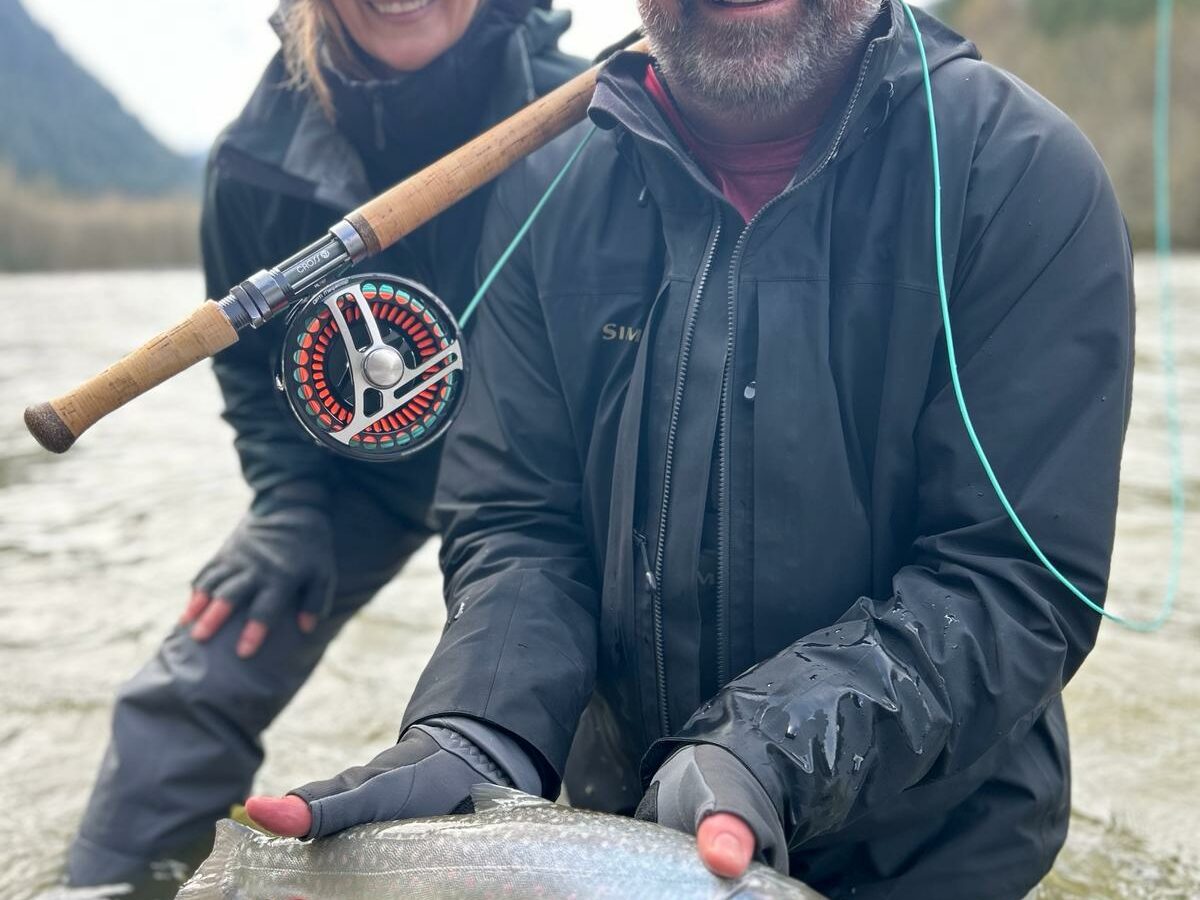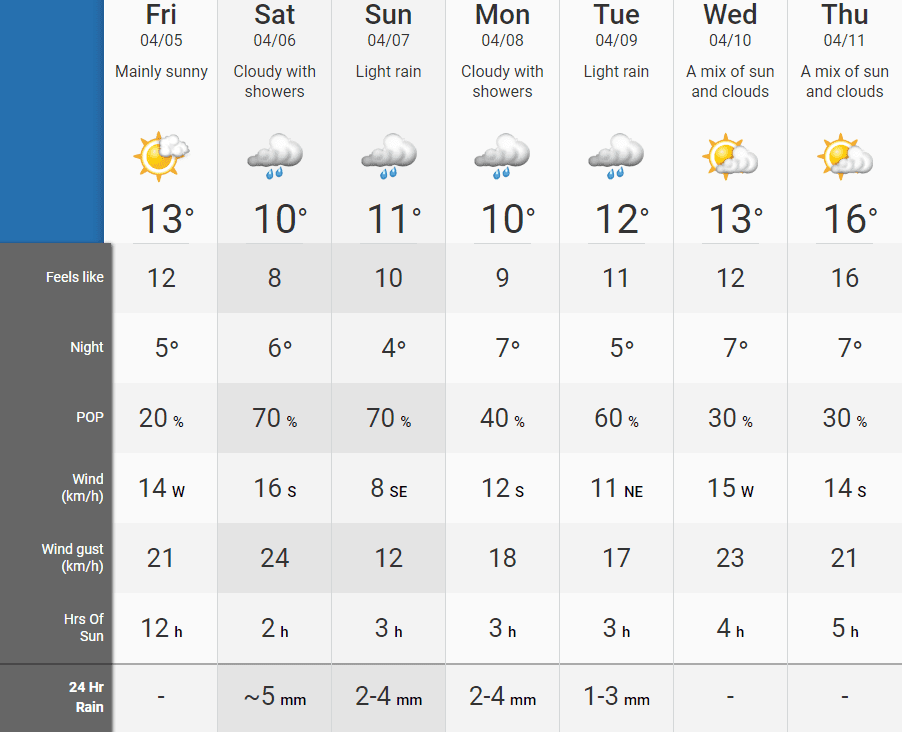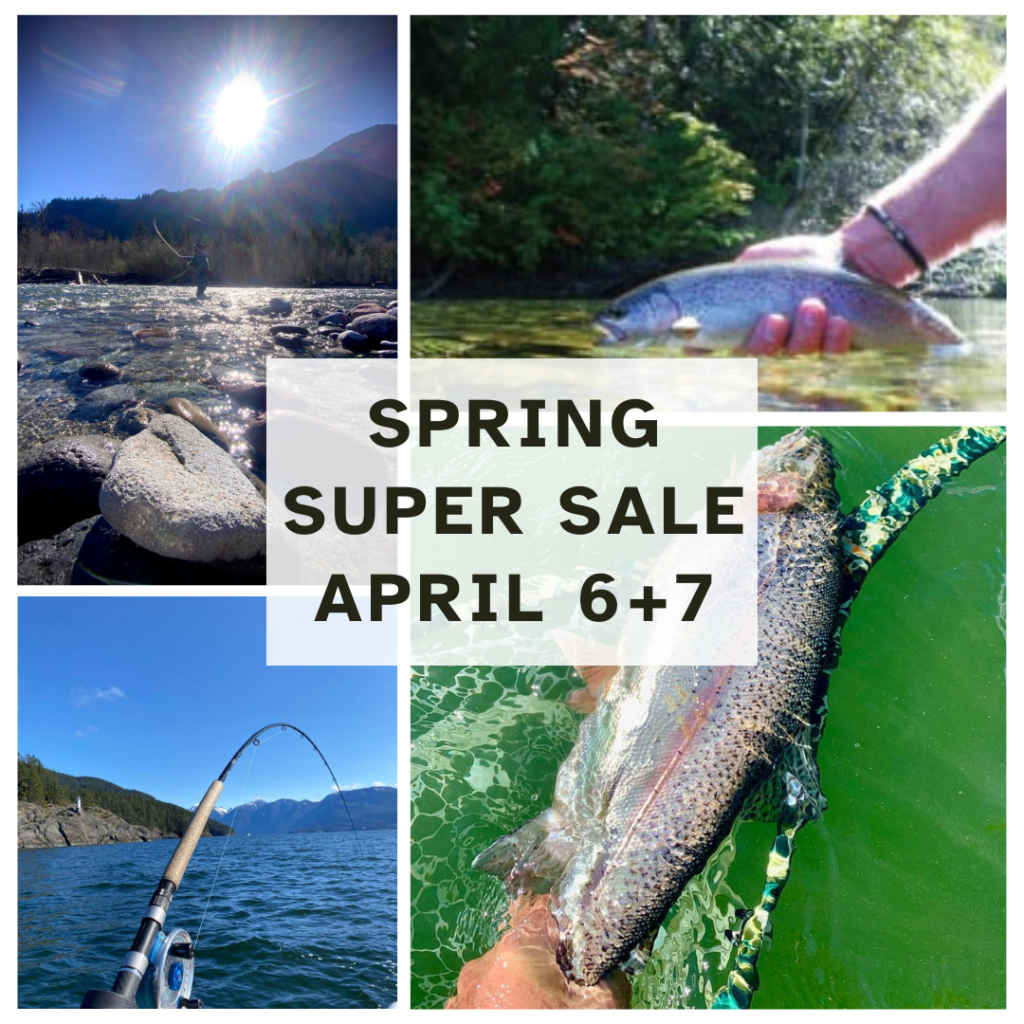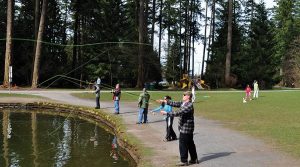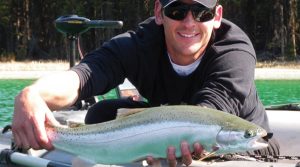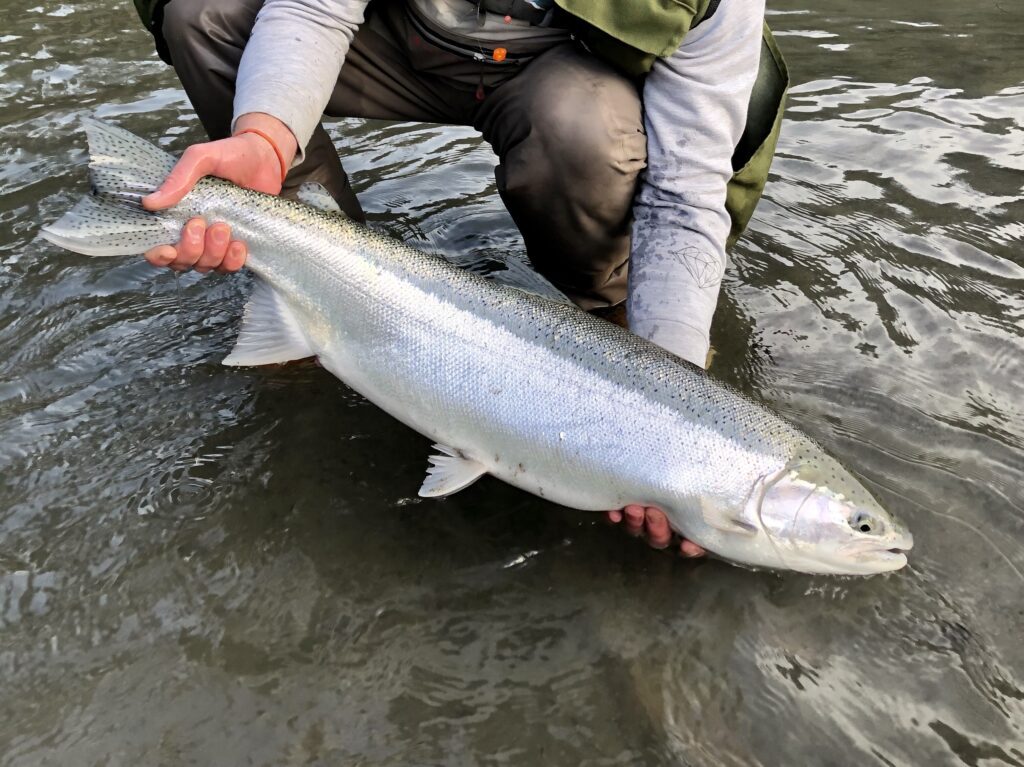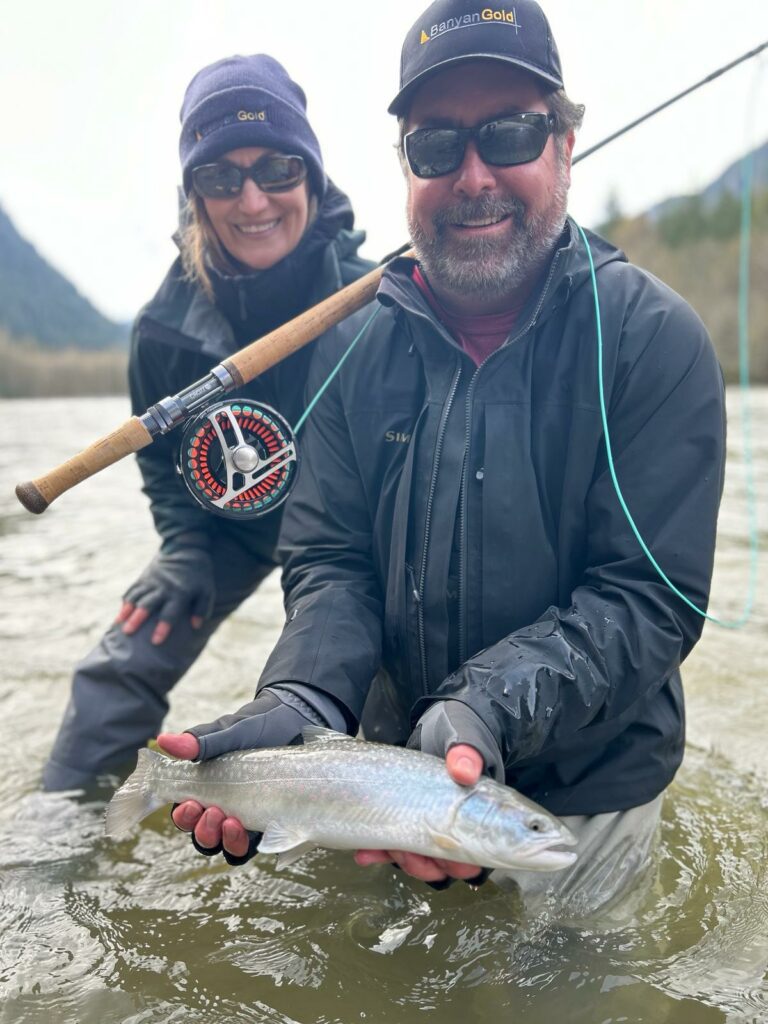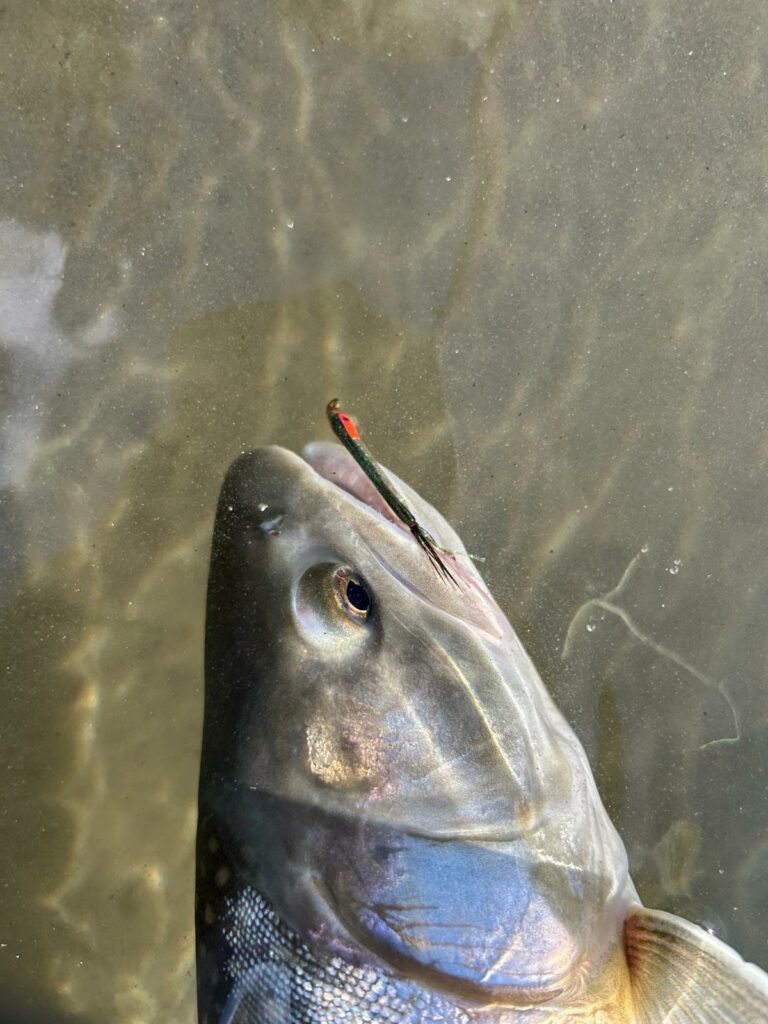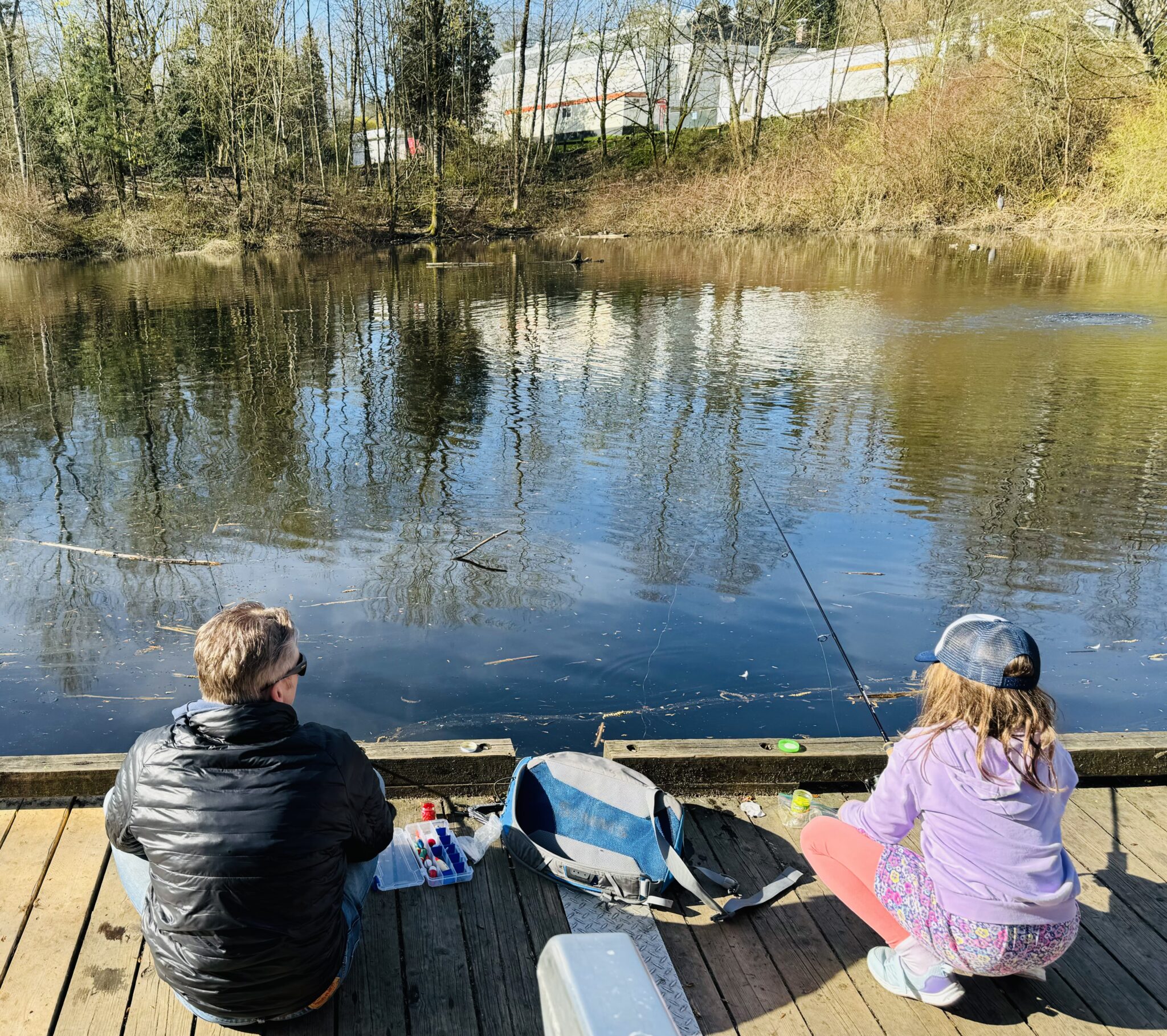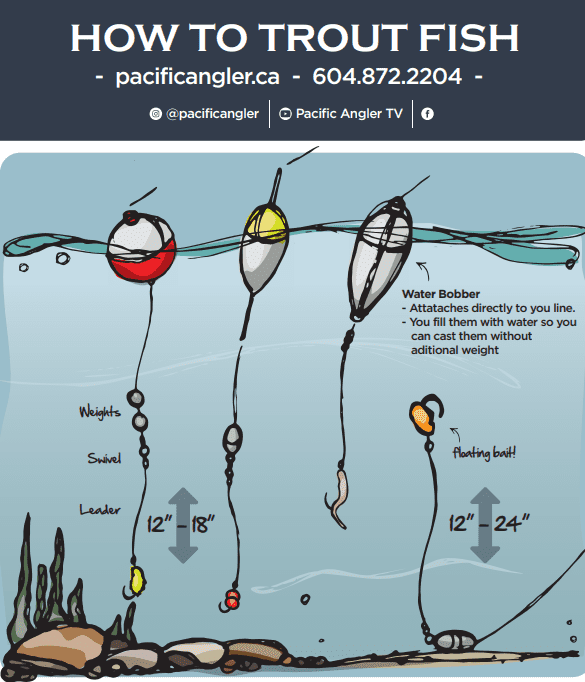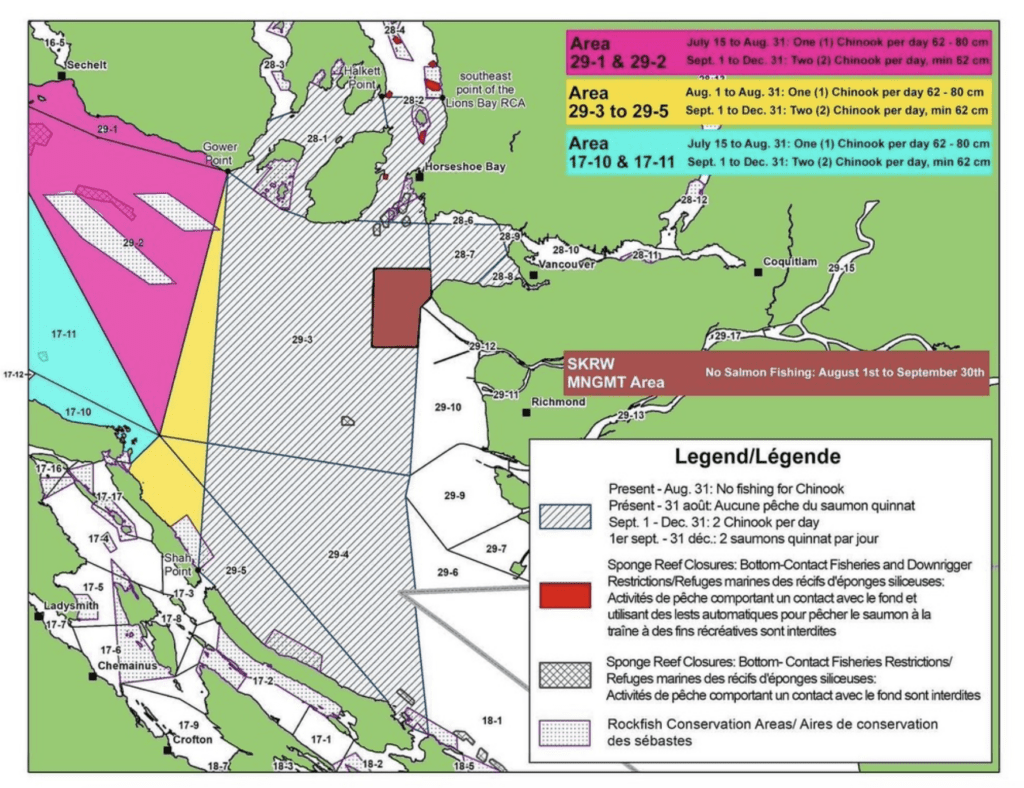OUTLOOK
Welcome to April everyone! We are having a big weekend at the shop. We are hosting our Annual Spring Super Sale. Everything in the store is on sale. This is the best time to get prepared for the Spring season. Details are below and keep an eye out for the sales list to be released in a special email mailout which will be on our social feeds later today! If you are reading this on our website and want to get this sales list emailed to you early plus all the fishing reports make sure you are subscribed to the Friday Fishing Report newsletter.
This weekend if you can’t make it down to the sale, we won’t hold it against you if you are out on the water. Spring is one of the coolest times of year to be an angler in the Vancouver area. We have river fishing, local lake fishing, bass fishing, carp fishing, and interior lake fishing on everyone’s radar.
We have good fishing weather with some light drizzles and overcast skies forecasted for the weekend. We would like to see it warm up a little, but we are well within seasonal norms, and we expect good reports from this weekend across the board.
In the report, this week we look at spring steelhead tactics in detail. It is a great time to get out but the tactics we used in January and February need to change to take advantage of the warmer more aggressive fish.
We also have a Sea to Sky update. It is one of the best times of year to target both steelhead and coastal trout species in this system.
When talking about coastal trout, cutthroat reports have been coming in over the last week and Eric has an update on what we have heard.
Lastly on the report front, we have an Interior Lake update. Lakes are icing off early this year and we are already hearing reports from the lower elevation lakes. Jason has details at the end of the report.
As a reminder, it is a new license season as well so if you are heading out, you will need to pick up a new license. Both freshwater and saltwater licenses are done online and you can get them here:
Freshwater – click here for licensing website.
Saltwater – click here for licensing website.
INDUSTRY UPDATES AND EVENTS
Annual Spring Super Sale
That’s right, our Annual Spring Super Sale is back! Come on into the shop this weekend to save big and get yourself geared up for all of our upcoming spring fisheries. The full sale list will be released later today so keep an eye on your inbox and our social media feeds.
Spring Super Sale Hours
Saturday April 6 – 10AM-6PM
Sunday April 7 – 11AM-5PM
COURSES
Introduction to Fly Fishing
This course was specifically designed to give the new fly fisher the basic knowledge, casting skills and fly fishing strategies to effectively fish our local BC waters. This course is comprised of two sessions; 3hr evening seminar and a 3hr casting session. The dates below show the seminar date first and casting date second.
Dates: (Apr 29 & May 5), (Jun 4 & 8), (July 11 & 15), (Sept 18 & 22)
Cost: $180.00+GST
Seminar Time: 6:30pm – 9:30pm
Casting Time(s): 10am – 1pm or 1:30pm -4:30pm
Coastal Streamer Fishing
Many Anglers focus on steelhead in the spring but with spring comes warmer waters, salmon fry, more active sculpin species and all the predators that feed on them. In this course Matt will go over different techniques and flies for targeting these species with single hand and switch rods on coastal streams. This course includes an evening seminar and a guided day on the water.
Dates: Seminar: Apr 9, 2024
Seminar Time: 6:30pm – 9:30pm
Seminar Only Cost: $75.00+GST
Seminar & Guided Walk’n Wade Portion SOLD OUT
Introduction to Fly Tying
There is no greater satisfaction than catching a fish with a fly you tied yourself. This Introduction to Fly Tying course was specifically designed to give you the fundamental skills needed to tie proven fly patterns used here in BC for trout, salmon, and steelhead.
This course consists of 3 sessions; each session is 3hrs.
Students are required to supply their own vise, tools and materials. A 10% discount is available on fly tying materials and tools purchased for the course.
Dates: Apr 10, 17, 24 SOLD OUT; TO WAITLIST CALL THE SHOP
Cost: $125.00+GST
Time: 6:30pm – 9:30pm
Introduction to Chironomid Techniques
Chironomids are the number one food source for trout in BC’s lakes; however, few anglers have taken the time to become true masters of this discipline. Those that do, are often rewarded with the largest fish. Trevor is a former member of the Canadian Fly Fishing Team and an excellent chironomid angler. Dedication to his sport has helped Trevor to become one of the top fly fishermen in the province as well as a fisheries biologist. This course is comprised on one 3 hour evening seminar. Content is for beginner to advanced.
Date: April 23
Time: 6:30-9:30 PM
Cost: $75.00+GST
Check out the full course listing here and give us a call at the shop (604.872.2204) to sign up today!
FRESHWATER FISHING REPORTS
Spring Steelheading Strategies
Spring has most certainly sprung, and with the new season come some new challenges and opportunities for those who are still interested in chasing steelhead. Higher water temps, longer days, more sunlight, new food sources, shifts in fishing pressure and the potential for snowmelt or rain, at any time, all combine to create a new, interesting level of depth to the art of steelheading.
Now, having said that, most of the basic principles of steelheading remain unchanged- be fast, be first, or be different. Of course, covering water is still the single most significant thing you can do to increase your odds of hooking a steelhead. Being the first one to put gear in front of a fish on any given day is also very beneficial, though this can be very hard or nearly impossible on rivers such as the Chilliwack. In such a case, being different can turn a day around… if you’re fishing behind someone, it can pay massive dividends to fish slightly different gear or cover slightly different water.
Of all the new factors that springtime steelheading introduces, warmer water temps are arguably the most significant. Higher water temps will increase the fishs’ metabolism, as they will have higher energy and oxygen needs thus, they will be more aggressive and willing to move, while often holding in slightly faster, better oxygenated water. More aggressive fish mean that they can be more willing to bite and more willing to chase a lure hence, swinging spoons and flies are often thought to be more effective when water temps rise. Keep this in mind when choosing what gear to run and consider having a spoon rod on your next trip; if you want to swing up a steelhead on the fly, now is the time to try.
The emergence of salmon fry in the spring also has an effect on steelhead fishing- simply because steelhead eat Salmon fry. Remember, steelhead are trout, not salmon, so they will actively feed during their time in the river, and they may survive spawning and head back to the ocean for another cycle. As such, swinging smaller spoons and flies or floating small spoons and Colorado blades can be deadly in the Springtime, as the fish are more aggressive due to the warmer water, and you are replicating a plentiful food source.
Another significant factor is simply the reduced angling pressure that is common for this time of year. A lot of the dedicated, die-hard steelheaders have been fishing hard since December, so they’re often a bit tired, burned out, and just less likely to head out there at this point. There are also a number of anglers who still believe that steelheading in the Springtime simply isn’t very good, so they hang up their waders when the weather gets nice. Less pressure is a very good thing for those who are still heading out there, as less pressure means you are more likely to encounter an aggressive fish that hasn’t been pressured by someone else.
Longer days and more sunlight can also influence steelheaders, though that effect isn’t normally as significant as the other things I’ve discussed. To keep it simple, longer days basically mean you have to wake up earlier if you want to get out there for first light… though you do have more hours of daylight to cover water. More sunny days mean that you may have to adjust your presentations when it gets really bright, or when the water is clear, and the sun is on it. Also consider leaving your heavy jackets at home when it’s sunny. Covering water involves a lot of walking/hiking, and heavy jackets + physical activity + warm days = basically cooking yourself to death.
As I’ve been saying in my recent C/V system reports, there will still be fresh steelhead pushing into the local systems through to the end of April. Some systems even hit the peak of their runs in the Spring and fish well right up until freshet. Remember that rivers can rise and potentially even blow out if there are several warm days in a row, thanks to snowmelt in the mountains. Be aware that some systems with longer runs, like the C/V, will have a mix of fresh and not-so-fresh fish in them, so make sure you’re handling darker fish with care to ensure they survive the release and spawn successfully. You may even see dark fish paired up on redds at this time of year. Intentionally targeting fish on redds is very unsportsmanlike and should be avoided. As always, be sure to pay close attention to the regulations on the individual system you plan on fishing, and check river levels and weather forecasts to know what kind of conditions you’re going to be facing before you head out.
Taylor Nakatani.
Squamish River Fishing Report
We saw the river bump up the last couple days from rain and snow melt, but the cooler temperatures and relatively little rain this weekend should keep river levels at a good height. With the bump in water, fish were out and active and the reports we heard all week were good.
The bump in water added some desirable color to the water that hopefully sticks around. Having clear water is a double-edged sword as the fish can definitely see what you’re throwing at them, but they have a lot of time to think about it. A bit darker water or the “steelhead green” will make fish more willing to take a swipe so don’t be afraid of larger streamer patterns.
When stripping fry patterns, add some more life to your retrieval. Sharp, 6inch strips can be really effective in enticing a bite and has the added bonus of doubling as a good strip set that you won’t get from slow lengthy retrievals.
If you’re not having much success, keep moving. With every inch in water level change the fish will migrate to new spots. Somewhere that was productive one day can be completely dead the following, so don’t be afraid to try every little piece of water, especially if there is color involved.
This time of year, fish mid-sized streamers in olive white and pink and you should be able to find active fish. Keep a few fry patterns in your box and if you see “rises” know that it’s probably not fish-eating bugs but fish hitting salmon fry just under that water surface.
When gear fishing all your classic beads and rubber imitations are worth throwing but also have Colorado blades rigged on your float fishing leader board and bringing a spoon rod to back up the float rod is not a bad idea.
As always, respect your fellow anglers. Don’t walk below anglers on a given run and have fun! There is no better time to get a dose of vitamin D and some good exercise.
Matt Sharp
Harrison River Fishing Report
Cutthroat fishing is in full swing on the north side of the Fraser. Warmer temps are steadily producing fry that will get braver in their never-ending search for food. Once the fry start to venture out of their natal streams and make their way to larger bodies of water they become vulnerable and start to school up. Hungry cutthroat love to chase schools of fry right up into the shallows.
Find the fry and find the trout. The Harrison area has many places for fry to seek shelter. Spend some time stalking fish in sloughs and back waters connecting the Harrison and Fraser River. Look for fry schools breaking the surface or birds actively targeting fry schools. You may get lucky and spot fish rising but that might not always be the case.
I love to target these fish on a 4wt or 5wt fly rod. As always, Andre’s fry patterns are a great choice for the Harrison area. Have a few fry in various colours to “match the hatch”. I also like to have some rolled muddler minnows on hand. I usually include some weighted and some unweighted versions. I fish the bead headed muddlers in areas with deeper pools or more current, and some unweighted patterns to suspend naturally like a fry in still or slow-moving water. We also have a fresh stock of squirrel strip slump busters and rabbit muddlers to round out your fly box. These larger patterns can generate a big hit from a hungry fish if the conditions are tough.
Gear anglers can get in on the action with lightweight spinning setups and small spoons. Small crocs are excellent fry imitations and make it easy to cover water effectively. Rooster tails and blue foxes create a lot of vibration and generate strikes. In the lakes or larger bodies of water you can also do well fishing the old bobber and worm. I sometimes start with this just to see if the fish are there before switching to casting or fly fishing.
Cover water and you will be rewarded.
Eric
STILLWATER FISHING REPORTS
Local Lakes Fishing Report
With Spring here, it’s time to get the family out or get in some practice in at the local lakes. They have stocked all of the major local lakes with spring catchables. The best way to figure out when and if this has happened is to check out Gofish BC website where to fish page. You can search lakes close to you, checking out the stocking report for more details such as access and amenities.
It’s common sense that you want to be on a lake that has been recently stocked. We have checked out Como, Green Timbers, Lafarge and Sanctuary Pond. They were all stocked around mid-month and have good numbers of fish in them right now.
Though it sounds easy, all of these lakes take a little bit of time to figure out and taking time to use light line and good hooks will pay dividends especially when there is pressure on the lake.
The simplest power bait rigs under a float are where to start, however, fishing flies or live bait can make a difference. When the fish have all seen Powerbait, running a small 14 sized chromi (fly) or classic ASB chironomid can be extremely effective under a short, rigged leader on a floating fly line with an indicator. Another very effective option is balanced micro leeches under an indicator.
If those who are new to fishing are scratching their heads about what I just said and are not interested in fly fishing, don’t worry. The flies listed above are classic indicator patterns but can be fished under an adjustable bubble style float on a spinning rod with great success. Come down the shop, pick up a couple of Powerbait options and then ask the staff about a couple flies they would recommend. Some days the power bait is the ticket, but it is common the flies will out fish Powerbait when the lake gets some pressure. Having both options is a good idea.
These local lakes fish well for the first month or so of warm spring weather and then slow down as water temps rise in the late spring and summer, so get out and enjoy it now!
Matt Sharp
Interior Lake Fishing Report
There are a lot more lakes off this week with somewhat warm and windy weather in the interior. Here is a list and there are likely others at similar elevations that are off and not on this list.
Swan, White, Shannon, Phillips, Pat (Six Mile), Morgan, Barnes, Monte, Stump, Sawmill, Jacko, Edith, Peter Hope, and Tunkwa. There are lower elevation lakes coming off in the Cariboo as well. So, if you are chasing ice off, you now have your hands full as there are lots of options from Merritt to the Cariboo and further up the highway.
Reports for the most part have been classic early season scenarios. Limited hatches with most of the fish having daphnia, scuds, leeches, bloodworms, and baby damsels in their stomachs. Your presentations should match this, either under an indicator or stripped on a sinking line where applicable. When all else fails, hang that blob and strip those boobies. Heck, even start with that as both techniques are incredibly effective!
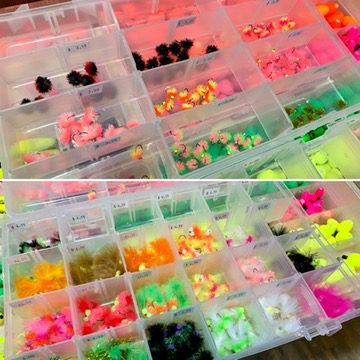
Some of the lakes that came off in late March have already turned and are starting to clear up. Even these lakes have been slow to see the chronies popping, but this is to be expected for the first week of April. Regardless of an early ice off, the water still needs to warm up to get those chironomids hatching. Next week is going to be good on a lot of these lakes as they enter their third week since ice off and we will start to see the chironomid hatches pick up! I will definitely be heading out in a week or two to take advantage of this.
In the meantime, if you watch the weather and wind, there is some early season success to be had, so get out there if you can!
See you in the shop or on the water,
Jason Tonelli
SALTWATER FISHING REPORTS
Vancouver Saltwater Salmon Fishing Report: Chinook Regulations Explained
It’s that time of year where the overly complicated chinook regulations take effect.
I will start by saying these closures are not warranted based on the abundance of chinook in our local waters that are not stocks of concern. Your chance of hooking a chinook stock of concern (Upper Fraser River) is less than 1% right now.
The science is in, and it is clear it should be open for chinook right now, but because of political pressure from NGOs and First Nations on DFO to keep it closed, you won’t be out there selectively harvesting even a hatchery chinook. We are still working hard to change that, but for now, let’s take a look at the regulations.
The main thing to understand is that the shaded areas with the lines in area 28 and 29 the regulations state no fishing for chinook. This means no catch and release.
Coho don’t open for retention until June 1, so that basically means you aren’t fishing those areas until then. Good news is the juvenile coho look to be around in good numbers and I expect we will have a good coho fishery again this year. Technically you could be out there fishing catch and release for small coho, aka Bluebacks, but I would advise leaving them alone until they are bigger and hatchery coho become open for retention on June 1.
Also keep in mind 29-6, 29-7, 29-9, 29-10 are always closed for salmon fishing and in general its very shallow in those areas, with the exception of 29-6, so don’t go fishing in those areas. You could go fish way up Howe Sound or Indian Arm for catch and release chinook in the unshaded portions of 28, but I suspect your success will be modest at best.
If you want to fish for chinook catch and release you could fish the yellow, pink and blue sections of area 29 and 17 to the west. The pink sections of 29 will open up for chinook retention July 15th, as they have the past few years. The blue section of area 17 will also open up for chinook retention July 15th, and the yellow section opens up August 1st.
We will also very likely get an opening for chinook along West Van in area 28-6 on August 1st like we have the past few years and then area 28-9 opening up later in August.
The date on the SRKW Management zone may also be extended into October, but as of today the information I could find shows September 30th.
If you want to do some travelling, there are marked select retention opportunities in area 16 to the west and area 17 to the south.
In the meantime, we will do some fishing for chinook (catch and release) as we have DNA permits to provide stock composition data to DFO. Crabbing and prawning have also been good, so we will be dropping traps. Rockfish and lingcod also open up May 1st in some areas, so we will be crossing to do that soon enough.
See you in the shop or on the water,
Jason Tonelli


